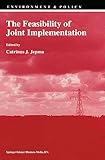The feasibility of joint implementation / edited by Catrinus J. Jepma
Por: International Conference on Joint Implementation (1994 : Groningen, The Netherlands) .
Jepma, Catrinus J [editor].
Tipo de material: Libro
impreso(a)
y electrónico
Series Editor: Dordrecht: Kluwer Academic, 1995Descripción: xiii, 386 páginas ; 25 centímetros.ISBN: 0792334264; 9780792334262.Tema(s): Control de la contaminación
Libro
impreso(a)
y electrónico
Series Editor: Dordrecht: Kluwer Academic, 1995Descripción: xiii, 386 páginas ; 25 centímetros.ISBN: 0792334264; 9780792334262.Tema(s): Control de la contaminación| Tipo de ítem | Biblioteca actual | Colección | Signatura | Estado | Fecha de vencimiento | Código de barras |
|---|---|---|---|---|---|---|
| Libros | Biblioteca Electrónica Recursos en línea (RE) | Acervo General | Recurso digital | ECO400083707470 | ||
| Libros |
Biblioteca San Cristóbal
Texto en la configuración de la biblioteca San Cristóbal |
Acervo General | 333.72 I5 | Disponible | SAA005971 |
Incluye bibliografía e índice
Disponible para usuarios de ECOSUR con su clave de acceso
CATRINUS J. JEPMA This volume contains the various contributions that were made during the International Conference on Joint Implementation, held near Groningen, The Netherlands, 1-3 June 1994. The conference was initiated by The Netherlands' Ministry of Housing, Spatial Planning and Environment -along with the Ministries of Foreign (Development Cooper ation) and Economic Affairs -and carried out under the responsibility of Foundation IDE (Groningen, The Netherlands). Its underlying idea was to bring together an international group of specialists on Joint Implementation (11) - from governments, NGOs, business and science -to discuss its feasibility of 11. The conference was timed between the 9th and 10th session of the Intergovernmental Negotiating Committee (INC) for a Framework Convention on Climate Change (FCCC) - which was by then considered as the most crucial phase preparing for the first Conference of Parties (CoP I; Berlin, 28 March - 7 April 1995) - in order to provide additional information or results that might serve as an input in the international negotiating process. The main purpose of the conference was, however, to sit back and have a reflection about what has now become known as 11, and evaluate from the perspective of academics, and practitioners, jointly with officials what promise the option really holds, and to evaluate under what socio-economic and political circumstances and conditions one could successfully proceed in setting out the framework for its further testing and l application. eng
Disponible en línea
Disponible en formato PDF
Subscripción a ELSEVIER 26 de diciembre del 2013
